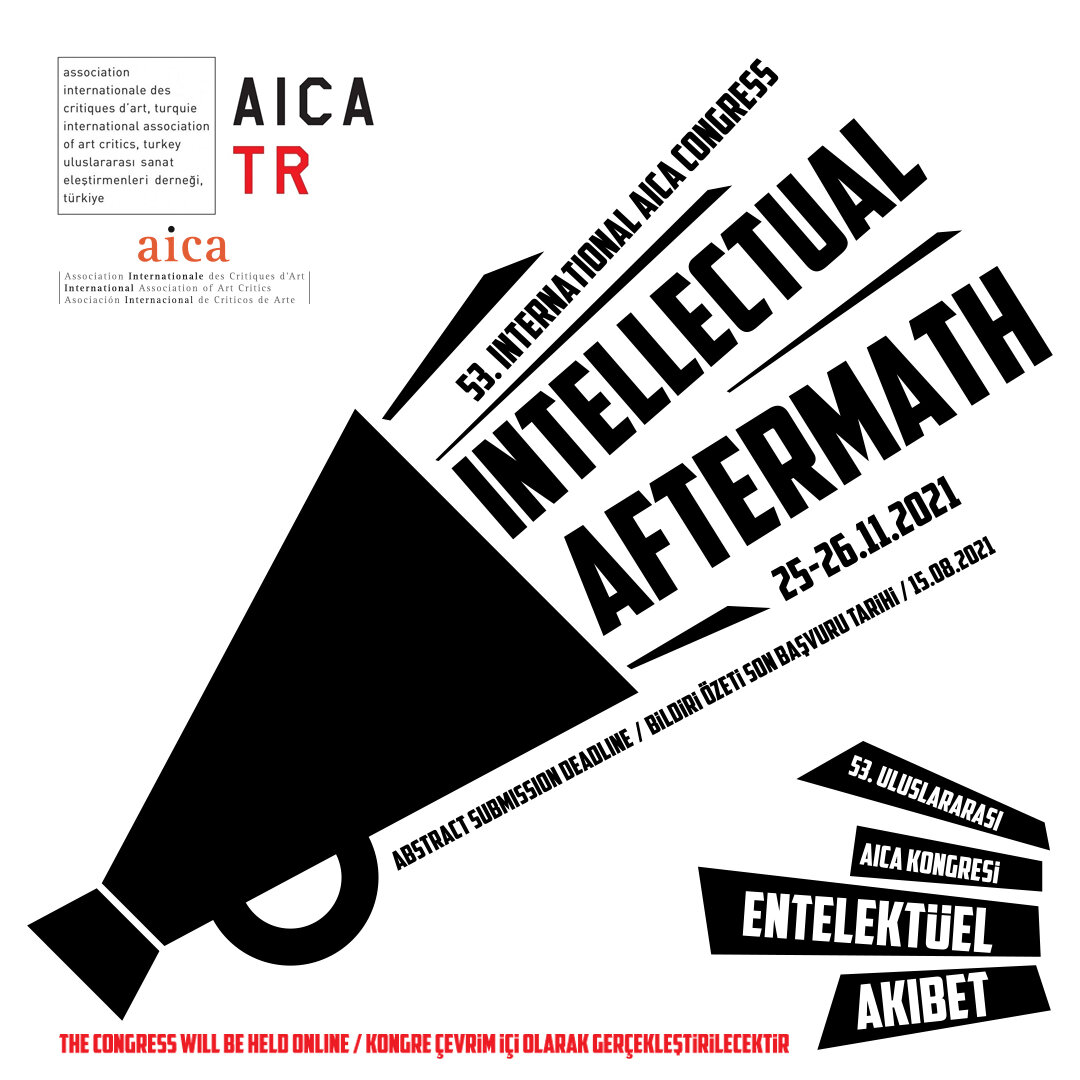53rd International AICA Congress, Turkey 2021
The Intellectual Aftermath
Open Call
AICA Turkey is organizing the 53rd AICA International Congress between 25 - 26 November 2021 with the cooperation of AICA International. The Congress, which will be held online and in English with the theme of “Intellectual Aftermath”, is making an open call that will enable art writers, artists, and art critics to share their academic research at an international level, as the COVID-19 pandemic, which has gripped the world for more than a year, has severely disrupted the artworld.
Congress Topic - Intellectual Aftermath
The 20th century was the century of boundless promise, whereas the 21st century is becoming a century of collapse. Humanity’s increasingly desperate efforts over the last century to control both nature and “the other” have backfired. While political discourse has become gradually harsher, the redistribution of wealth has grown more obscenely disproportionate. In today’s polarized world, those who follow the mainstream ideologies tend towards fanaticism, and the political abstentionist minority continues to dwindle. Economic structures have become debilitated, our faith in systems has been shaken, and the cold egocentric gaze has turned back on itself. Now the relentless march of globalization is faltering, and climate disasters and epidemics follow one another in quick succession. The Y2K bug that threatens all digital systems, the subprime mortgage crisis which brought the United States to the brink of collapse, Britain’s departure from the European Union, North Korea's nuclear weapons program, and Australia's vast forest fires with the wholesale destruction of wildlife and the latest Covid-19 pandemic that has spread worldwide from Wuhan, in China, are but few of the events since the beginning of the millennium that have profound global impacts.
The current condition, which puts the heavy burden from the previous century on our shoulders and adds to the imbalances in the existing order, can be conceptualized as “the intellectual aftermath”. This term not only expresses the damage incurred by our acceptance of the supremacy of reason in the name of scientific and technological progress but also suggests finding ways of compensating for this on the grounds of post-modern thought. The twentieth century’s single-minded colonialist view, which is solely based on a form of post hoc reasoning, is, therefore, the determining factor of this “intellectual aftermath”.
Most of the incidents we have witnessed in the last two decades are unlike anything we have witnessed before. Foremost are the phenomena that shape the evolution of culture and the culture of evolution, such as climate crises, social psychology, differentiation of patterns of economic production and distribution, political dilemmas, threats of global terrorism, wars, religious conflicts, the refugee situation, gender issues, and pandemics. Within this context, “the intellectual aftermath” demands new ways of thinking on multiple levels, where we may now start to address how people who have had to gradually deprive themselves of many of the things they could once take for granted can find the confidence to measure up to the future.
Our aim in this congress is to evaluate the concept we have outlined above and to explore its social and political ramifications by asking a number of questions, such as: How will the present crises completely reshape our lives? Will humanity manage to repair its structures, or will it have to rebuild them all over again? What role will art theory, practice, and criticism play, from the political, economic, social, psychological, or cultural perspective, in helping us to understand the intellectual aftermath and in shaping the current process of change? Will art and culture be able to become independent of economic criteria and ideologies, if they are to be key elements in a new kind of socio-political discourse? Or is it the inevitable destiny of art and its consumers to be consumed and destroyed by the system?
The 53rd International AICA Congress aims, through the lens of art, to examine the concept of the “intellectual aftermath”, as the primary condition of our age, and to explore possible new horizons for the future.
Subtopics:
How does art reflect the collective traumas inflicted on society?: Art practice and theory, as forms of reconstitution.
How can we structure non-global economic models that differ from the existing neo-liberal principles of both art institutions and the art market?
Within the condition of the ‘Intellectual Aftermath’ how does art theory embrace issues related to censorship, political correctness, and Eurocentrism.
How do political realities impinge on art? What is the effect of art on politics?
Art in times of crisis
Important Dates
Abstract Submission Deadline: 15 August 2021
Notification of Acceptance / Rejection: 30 August 2021
Draft Program Announcement: 15 September 2021
Draft Full Paper Submission: 1 November 2021
Full Program Announcement: 5 November 2021
Presentation Submission: 15 November 2021
Congress: 25-26 November 2021
Full Paper Submission Deadline: 15 December 2021
You can download the template for abstracts in word format from this link.

